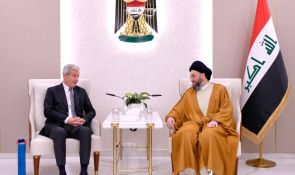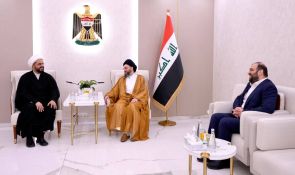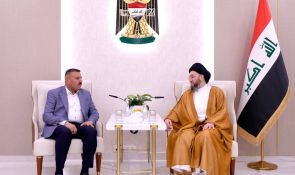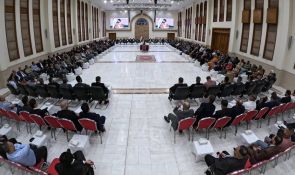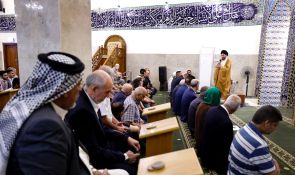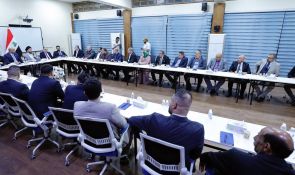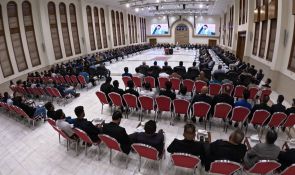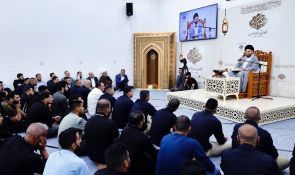Sayyid Ammar al-Hakim stresses that solving the current political crisis must be an Iraqi one distantly from foreign interferences
Sayyid Ammar al-Hakim, head of the Islamic Supreme Council of Iraq (ISCI), has called on the Iraqi Slate to reconsider its decision to boycott the sessions of the parliament, stressing that the solving of the current crisis must be an Iraqi one, distantly from foreign interferences due to the Iraqis, rather than others, being familiar with their own domestic affairs. His Eminence also called on the Iraqi government and the ministerial committee in charge of looking into the demonstrators’ demands to speed up the addressing of the demonstrators’ legitimate demands in order to assure the public about the seriousness of its measures. He urged the political blocs to ratify the laws in order to solve the problems and release the prisoners who are not convicted, warning against undertaking a decision on behalf of the Iraqi people and its spilled blood to release terrorists from al-Qaida and other organizations that have shed the blood of innocent people. He stressed that the measures need concerted efforts. This came up during the celebration of the birth anniversary of the Holy Prophet and the week of global interfaith concord which Iraq’s Aiziz (may Allah sanctify his soul) called for and which witnessed speeches by the representative of the Untied Nations, Martin Coppler, the general secretary for the Verdict Committee of the Ahl al-Sunna wal Jama`a, Sheikh Mahdi al-Sumayda`i, the ambassador of the Vatican, Georgio, the representative of the Sabian group (sheikh Sattar Jabbar), the speech of the representative of the emir of the Yazidis (Tahsin Beg) and the speech of the office of the Christian Endowments (Bishop Mar Ephraim Yousuf Abba) at the Baghdad office of His Eminence on Wednesday, January 30, 2013.
Patience of the Iraqis is the object of honor and pride
The head of the Islamic Supreme Council of Iraq (ISCI), explained that solutions do not come fully but when the public sense the justice and equity and when injustice is removed, stressing that the patience of the Iraqis is the object of honor and pride when the soundness of the paths is ascertained. He explained that the Iraqis, theologians, tribal sheikhs, elite groups, competencies and the masses have proven their high ability to solve problems when the souls are pure and when people sit at the dialogue tables. He stressed that the Iraqi army is a patriotic institution of which everyone is proud, and it must be protected from entering into the political disputes. It must be kept within its national missions so it will be the safety valve for the Iraqis.
Recommendations of the Religious Marji`iyya ensure solving the crisis if all groups apply them
His Eminence stressed that the religious Marji`iyya (highest religious authority), due to its wisdom and defense of all Iraqis, represents a comfort axis, calling for implementing its deep subjective recommendations which ensure the solving of the crisis if they are endorsed by all groups. He pointed out to the Iraqi people, in all its spectrums, will remain the main label and a quantum addition to the Iraqi rose bouquet; therefore, the national unity must be safeguarded. He called on everyone to adopt self-discipline no matter what the disturbances may be, explaining that everyone is invited to adorn himself with patience, renewing his support for every democratic, constitutional and legal venue and stressing that peaceful demonstrations are protected by the constitution. He stressed his defense of this right for all citizens of Iraq, placing his hope on the Iraqi people as it follows the wisdom of solidifying the ranks and monitoring the intruders who raise sectarian slogans or raise the ceiling of the demands that are distant from the ambitions of the Iraqi people.
Message of the Prophet (P) is based in Tawhid, Adl, fairness and tolerance
Sayyid Ammar al-Hakim explained the dire need for deriving lessons from this great event, i.e. the anniversary of the birth of the Greatest Prophet (P) and of the valiant Imam Ja`far ibn Muhammed al-Sadiq (peace with him), explaining that the plan of the Prophet (P) which he carried for humanity is based on Tawhid (belief in the Unity of God, Adl (Justice of God), fairness, tolerance, cooperation, integration and the dissemination of the culture of looking for commonalities. He pointed out to the Prophet (P) being interested in building the individual as part of the society which he influences and by which he is influenced, stressing that Islam emphasizes good manners and the interaction of members of the society among themselves. He explained that the society means individuals and interaction. Without these two pillars, the society lacks interaction. His Eminence added that man’s desire to make the society is natural and innate because the origin of this desire lies in natural causes. He pointed out to the Qur’an talking about the pious, those who are outgiving with knowledge, experience and experiment, stressing that outgiving is a duty which Islam awards the characteristic of an obligation, of discharging a trust. He added saying that man is the one who carried the trust and explaining that the Islamic aspect submits brotherhood, the trait of mercy, then it raises the ceiling to reach the level of the single body, that people are equal just like the teeth of a comb. He explained that man by nature is good, and there is nobody who cannot be reformed, nor is there anyone who does not need perfection, nor is there who is absolutely poor.
Islam’s rulings care about social affairs
His Eminence stressed that Islam’s rulings care about social affairs: In marriage, for example, Islam sees that getting married is better than building mosques, that obedience of Allah is conjoined with obedience of the parents. It obligates the maintaining of ties with relatives and banks boycotts, commending are about one’s neighbor. He added saying that in essence, prayers were congregational, then the Muslims were permitted to pray individually and at the same place, which is the mosque, towards one and the same qibla (direction of the prayers). Add to this the fast, pilgrimage and zakat, all being rulings that carry social dimensions. He explained that Islam focuses on the values of love, generosity, humbleness, thinking well of others, assisting the weak, visiting the sick, etc.
The celebration witnessed a massive and political attendance from members of the Iraqi parliament and heads of diplomatic missions in Iraq in addition to songs that sung praise of the one for whom the occasion is celebrated which were sung by the Islamic Wafa Band.


